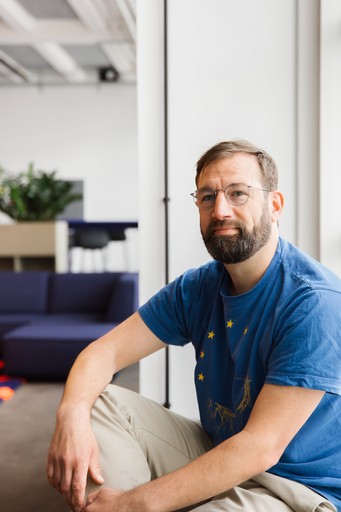Service Design helps to see the interaction between people and companies holistically, to think it in a new way and – very important – to optimize it continuously. The beauty of it is that the Service Design mindset and toolset not only support designers, but can also be used in the daily work of all our teams, from technology to content management, to provide better advice to our clients.
Reason enough to make sure that as many denkwerkers as possible know and use this knowledge. And that's why we developed a new internal training course last year: the Service Design Basic Training.
Rethinking and optimizing services
Briefly explained, Service Design is the design of services. This sounds logical, but there is much more to it: Service Design also helps organizations to improve and renew their services, both large and small. The important thing here is the human-centered perspective, so that the service becomes more useful, usable and desirable for customers, and at the same time more efficient and effective for the organization. Why this matters? 63% of the world's wealth comes from the service sector – and the trend is rising. Increasingly important important are also services that enhance our quality of life and answer environmental questions.
This fits in very well with our motto #createpositivechange – and that's precisely why we want to provide our clients with even better, and even more holistic, even more people-centric advices. We can do this by teaching our colleagues at denkwerk the necessary know-how of Service Design.
"Service Design helps us to see the interaction between people and companies holistically, to rethink it and to constantly improve it."
Jochen Schlaier, Managing Director at denkwerk
Two days of Service Design focus
In our 2-days Service Design Basic Trainings, we start with up to twelve denkwerkers into a Service Design Deep Dive. Besides the history of Service Design and theoretical basis, the focus is on two things: practice and collaboration. In interdisciplinary groups, participants master small and larger tasks while developing a new service or optimising an existing one. Not only client projects are considered, but also internal services such as the onboarding process for new denkwerkers.
That way, the groups not only get to know the Service Design process in theory, but apply various methods and tools directly in practice – from exploration and ideation to prototyping, testing and developing an implementation plan of the service. They are supported by the Service Design trainers and mentors Cristine Lanzoni and Kristina Hentze as well as alternating co-facilitators from our Experience Design department.
"The training was a great format to get a deeper insight into the methodology of Service Design. Moreover it made me feel being part of a unified denkwerk team aiming for an unified knowledge base."
Feedback from a participant
Service Design Ambassadors are ready for more
In one year, a total of 13 training sessions took place in our offices in Cologne, Berlin and Hamburg. The feedback is consistently positive: The denkwerkers not only appreciate the opportunity for internal training, but also the collaboration and interdisciplinary networking with their colleagues in a pleasant and friendly atmosphere.
More than 100 denkwerkers have already received their Service Design Ambassador certificate and are ready to use Service Design in their daily work. And the first service concepts developed during the training courses are also on the home stretch. These include "Connecting denkwerk" – a internal service designed to help employees exchange professional and personal views on topics relevant to them – and an AI-supported tool for creating personas with a focus on accessibility.
And for our clients, we're also in the process of developing a format that helps them take a step back and zoom out to look at and orchestrate the overall experience of their service system. This is exactly how we are implementing our motto #createpositivechange – today and in the future.
Share this Spark
